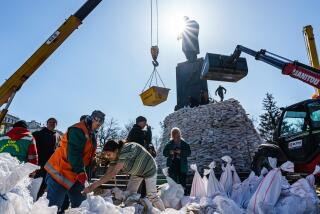Will Chechnya Become Yeltsin’s Afghanistan?
- Share via
MOSCOW — President Boris N. Yeltsin’s decision to invade Chechnya, the breakaway North Caucasian republic, inevitably invites comparisons to previous Russian adventures along the fring es of its empire. Like the ill-starred interventions of the past, the incursion is more politics than security threat. But if Yeltsin has truly disregarded the military disadvantages in Chechnya in search of political gains to be won from a short and “glorious” war in the Caucasus, he may have made a tragically naive decision that ignores history and promises grim consequences.
One obvious Chechen parallel is the war in Afghanistan. Deputy Defense Minister Boris V. Gromov and Gen. Alexander I. Lebed, two prominent veterans of the Afghan War, have stressed those similarities in their public opposition to the invasion of Chechnya. The Soviet army stayed nine years in Afghanistan seeking to fulfill the political goal of supporting communist regimes abroad. For that vague goal, the Soviets paid dearly in lives and resources, brutalized and fractionalized the Afghan people, and eventually left the country less stable than they found it.
But the comparison between Afghanistan and Chechnya may be strained because Moscow considers the Chechen conflict an internal affair, a claim that has withstood international scrutiny. Closer to point is Mikhail S. Gorbachev’s use of force against nationalistic crowds in Tbilisi, Baku and Vilnius during the twilight of the Soviet Union. Although Chechnya has been characterized by Yeltsin as a nest of bandits, its chief crime--like that of the Georgians, Azerbaijanis and Lithuanians--is refusing to remain peacefully under Moscow’s control.
It is the specter of a wider Caucasian war that is most chilling to Russians, since such conflict has great historical resonance. Yeltsin himself hinted at the risks last August: “If we were to apply pressure by force against Chechnya, it would arouse the whole Caucasus; there would be such a commotion, there would be so much blood that nobody would ever forgive us.”
Russian rulers have long sought dominion over the resource-rich, strategically located region, and have always encountered stiff resistance from its inhabitants. In the 19th Century, for example, Russia used 300,000 soldiers and took nearly 30 years to crush Shamil, the great Muslim leader of Daghestan and Chechnya. Today, some Chechens believe that if Shamil had been born Chechen, the czarist armies would never have subdued the Caucasus.
The Russian writers Tolstoy and Pushkin portrayed the Chechens as hospitable and chivalrous, but also stressed their ferocity in war and vindictive character. Chechnya’s predominantly Muslim, clan-based society, regulated by a ruthless system of blood feud, has never adapted well to colonization. Regular revolts continued even under Soviet rule. In 1944, Josef Stalin deported the entire Chechen population to Central Asia on trumped-up charges of Nazi collaboration. Rehabilitated in 1956, this experience of exile remains fresh in Chechen memory, fueling their continued resistance to Russian hegemony.
Common hatred of Moscow is a potentially strong unifying force in the typically fragmented region. Indeed, the loosely defined Confederation of Caucasian Peoples has warned Moscow that war against Chechnya means war against the entire Caucasus, and rumors of recruiting efforts throughout the North Caucasus abound.
Unfavorable military conditions in Chechnya also reduce the chances of a “clean” military victory for the Russians. Cold, short and foggy days are not an ideal environment for an invasion. Furthermore, the military forces are composed of an untested combination of interior ministry and regular army troops. Worse, the refusal of Maj. Gen. Ivan Babichev to turn his column’s guns on protesting Chechen civilians suggests insubordination and confusion at high levels. Taken together, the ruthless occupation of Chechnya may usher in a prolonged period of guerrilla warfare in the Caucasus, not to mention terrorist retribution in Russian cities and massive refugee flows.
The Chechen capital of Grozny--the Russian word for “terrible, fearful”--takes its name from a fort Russian occupiers established there. Faced with a tenacious resistance, the Russians discovered they could only maintain dominion over the North Caucasus through the use of terrible, fearful force.
The current crisis in Chechnya, eerily reminiscent of the Afghanistan and the Caucasian wars, suggests that the authorities in Moscow have failed to learn the lessons of that past. Yeltsin’s reckless adventure on the restless fringe can only shake faith in the Russian Federation, not hold it together.
More to Read
Sign up for Essential California
The most important California stories and recommendations in your inbox every morning.
You may occasionally receive promotional content from the Los Angeles Times.










